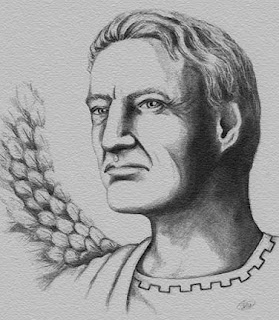Wednesday, March 31, 2010
Cassius, motavation to kill

This essay is based on the character Cassius, from the play Julius Caesar written by Shakespeare. "Ye gods, it doth amaze me a man of such feeble temper should so get the start of the majestic world and bear the palm alone." (Act one, scene 2 lines 127-129). Cassius does not believe Caesar is fit to rule Rome, and is becoming a tyrant. The man Cassius is referring to is Caesar. Cassius believes a "man of such feeble temper" is not fit to rule all of Rome. Cassius thinks Caesar should not hold all power. Cassius's jealousy of Caesar and greed for power is his motivation for killing Caesar, which he justifies as an act for freedom from tyranny.
Cassuis's motivation to kill Caesar was driven by his jealousy of Caesar. Caesar has gained more power then any other man in Rome and Cassius thinks he does not deserve it, that he is not worthy. Cassius jealousy of Caesar promotes him to start the conspiracy against Caesar and later commit his death. "What trash is Rome, what rubbish, and what offal when it serves for the base matter to illuminate so vile a thing as Caesar!" In this quote Cassius is trying to convince Brutus to join the conspiracy with him. Cassius is comparing Rome to "trash" and "rubbish" and "offal" when it "illuminates", Caesar like Rome is a terrible place when Caesar shall be king. Cassius refers to Caesar as "a thing" which shows how much disrespect Cassius has for Caesar. Cassius calls Caesar "vile" as if Caesar repulses him. The thought of Caesar ruling is disgusting to Cassius, he is saying that if Rome lets Caesar rule, it will be complete garbage and a terrible place to live and therefore Caesar does not deserve to rule. "And this man has now become a god and Cassius must bend his body if Caesar carelessly but nod on him" Cassius still trying to convince Brutus to join the conspirators and is now showing Caesar's weak side. Cassius is telling Brutus of the time when he saved Caesar form the waves of the Tiber because he could not save himself. Again the "man" Cassius is referring to Caesar. Cassius is referring to Caesar being a "man" not "a god" like other Romans treat him, because a god would have been able to save himself. Cassius does not think Caesar deserves to be treated like "a god". Cassius hates that he must "bend his body", bow to Caesar, which builds up more hate for Caesar and the power he holds but does not deserve. Caesar cannot even save himself from drowning, so why does he get to rule Rome and why must Cassius bow to him. Cassius saved Caesar from the waves of the Tiber and yet Cassius must bow to Caesar if he "carelessly but nod", Caesar should be treating Cassius like a god, not the other way around.
Cassius greed drives him to want the most power, and therefore cannot stand if anyone else has more power than himself. Cassius's greed drives him into wanting Caesar dead, because he has more power Cassius must kill him. "When could they say, till now, that talk'd of Rome, that her wide walks encompassed but only one man." Cassius is explaining to Brutus why he should join the conspiracy against Caesar. "When could they say till now", Cassius is referring to how Rome has always been a democracy "till now", because of Caesar. Caesar is becoming a tyrant. Cassius talks of Rome's "wide walks" meaning there is room for more then "one man" to "encompass" Rome. Meaning not only "one man", that man being Caesar, should have all power in Rome. Cassius is trying to convey the message that Rome is meant to be democracy, however Caesar is changing that by becoming a tyrant. Cassius wants democracy so that no one rules above him. Cassius does not want anyone to have more power than him because of his greed. "That part of tyranny that I do bear I can shake off at pleasure. Again Cassius is referring to Caesar becoming a tyrant only this time he is conveying this to Casca, who at this point is also being invited into the conspiracy by Cassius. The "part of tyranny" Cassius is talking about is having less freedom, which he makes reference to being treated like you are in slavery to Casca. This shows how awful Cassius believes it will be if Caesar rules above him. Cassius does not want anyone ruling above him "that part that I do bear", Cassius feels like he must bear that fact of someone having more power then him, like it is a struggle for him. "I can shake off with pleasure" Cassius would rather kill himself then be beneath Caesar. Cassius is saying that he would rather be dead then live with Caesar as king and that he would be miserable alive if Caesar is king. Cassius wants the most power even if he must share it. Cassius's greed motivates him to kill Caesar, and along with it his power so that Cassius's hunger for power is satisfied.
Cassius believes Caesar is not worthy of his power and does not want anyone to hold more power than him. His jealousy of the power Caesar holds and greed for more power drives him into starting the conspiracy against Caesar, and then leading the conspirators into committing Caesar's death. Cassius achieves his goal of killing Caesar however Antony resumes Caesar's place and Cassius loses all power in Antony's new government and therefore did not achieve his real is goal. Although Cassius makes his end goal seem like a worthy deed to other conspirators, for the good of Rome, his goal was primarily for himself motivated by his jealousy and greed.

